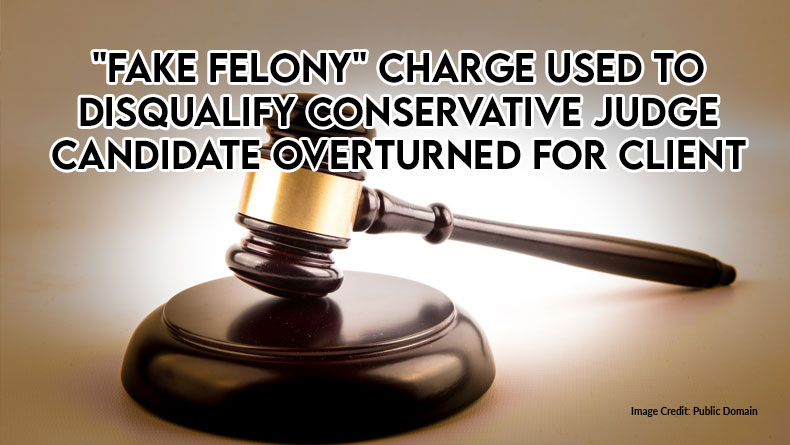Image Credit: Public Domain
The Tennessee Conservative Staff –
A year ago Tennessee counties were on the election battlefield for all county offices. This included judicial elections in every county, which occurs only every eight years.
In Williamson County, the race for juvenile court judge exploded when judicial candidate Connie Reguli was convicted of two felonies on April 20 right in the middle of early voting.
This news was splattered all over the headlines of the local Williamson Herald and active social media accounts such as Facebook’s “Back to School – Williamson County”.
The following day, Judge Joseph A. Woodruff appeared at the Williamson County forum for county commission candidates and approached one of the conservative candidates to inform them of the conviction.

According to our sources, County Commissioner Sean Aiello used the news of Reguli’s felony conviction to discount all of the county commission candidates that had been endorsed by local PAC Williamson Families stating that WF had endorsed a “felon” for judge.
The Tennessee Conservative ran the story too, however, when interviewing Reguli, she said it was a “fake” felony used to discredit her and remove her from the ballot.
Reguli was, in every other way, fully qualified as a judicial candidate on the Republican primary ballot set for May 3. She had served as a prosecuting attorney in the Nashville district attorney’s office; she had over 25 years of serving families throughout Tennessee as a family law attorney; she had participated in over forty appeals at the state level; she had brought civil rights actions on behalf of families for abusive government tactics; she had been on the board of Tennessee Republican Assembly; she had participated in developing news stories defending the legal rights of families; and she had developed a social media following of over sixteen thousand people across the United States of families who had been adversely affected in the family court system in a Facebook group called “Family Forward Project.”
Reguli was endorsed by the Tennessee Republican Assembly, Williamson Families, and the Tennessee Voter Guide.
But Reguli did something else. She called out the Williamson County juvenile court judge, Sharon Guffee, for her “abusive and tyrannical rule” over families that found themselves in the court system.
Reguli claimed that Guffee had contributed to the death of a young man whom she incarcerated instead of allowing him to go home with his mom. The young man had a seizure disorder and after Guffee ordered him to be incarcerated he was denied his seizure medication and died.
Reguli claimed that Guffee had ordered another child in solitary confinement instead of allowing his mother to place him in a brain rehabilitation facility. And Reguli did not make these claims in a vacuum. In March 2018, eight families had appeared at the Williamson County Commission meeting and told their horror stories of Judge Guffee’s courtroom.
When Reguli started her campaign in February, she also called out Williamson County for initiating a plan for a new juvenile jail facility that would cost the taxpayers $281 million and allow for the incarceration of even more children under the empirical rule of Guffee.
Reguli also claimed that the use of “mental health” beds in the facility would be at the sole discretion of Guffee and it could be easily abused because confining “severely emotionally disturbed” children was worth nearly $500 per day which would be charged to the Department of Children’s Services, ultimately the taxpayer. Not that Reguli believed that such a service might have some value, but she knew, based on years of experience, that some government decision-makers are motivated by the dollars and not the welfare of the population.
Reguli’s activism was a problem for Williamson County officials invested in the development of this multi-million dollar project. Reguli also claimed that Guffee’s aggressive removal of children from their parents was, in part, motivated by the for-profit foster care and adoption business.

Reguli told The Tennessee Conservative that the conviction was a “fake” felony because Judge Joseph A. Woodruff had changed the law to secure the conviction against her. None of the other news outlets touched this subject. Reguli believed that this fake conviction would be overturned on appeal, but of course, it would be well past the election which was set two weeks away on May 3.
And now it looks like Reguli was right. On Friday May 12, the Tennessee Court of Criminal Appeals released its opinion on State v. Wendy Hancock, Reguli’s client who was her co-defendant and had been convicted in July 2021. Hancock’s appeal advanced to the appellate stage before Reguli could even secure her transcripts on the April 2022 jury trial against her.
In fact, Reguli was exactly right. Williamson County Appellate Judge Timothy Easter wrote the 18-page opinion that reversed the conviction on Wendy Hancock, Judge Easter wrote, “The [jury] instruction given herein omits a material element of the offense, namely the expiration of a period of lawful visitation.” When Judge Woodruff, on his own accord, wrote the jury instructions he did so to fit the facts of the case, and lowered the State’s burden of proof, impairing the constitutional rights of Reguli and her client.
Judge Joseph A. Woodruff did change the law, not the job of the judiciary, but perfectly reserved for the legislative branch of government. This level of judicial activism is dangerous. Although judges have the power of judicial “review” to determine if the legislative branch has created a law that conflicts with the constitution, the judicial branch does not have the power to rewrite the laws passed by the legislative branch to fit the facts of the case. This is exactly what Judge Woodruff did. This case illustrates just how radical and powerful a state court judge can be.
The relationship between Joseph A. Woodruff and Sharon Guffee may be the motive for Woodruff’s judicial decisions. Woodruff was a contributor to Guffee’s campaign; Guffee and Woodruff had relied on each other as signatories on each other’s judicial petitions in 2014; and Woodruff is the next-door neighbor to Marianne Schroer who served as the executive director of CASA (court appointed special advocate) who worked closely with Guffee. And Joseph Woodruff participated in the county committees for the development of the Juvenile Justice and Jail project in Williamson County.
The rules of judicial conduct historically prohibited judges from politically supporting other judges during an election, however that changed in 2016 when the Tennessee Supreme Court changed Rule 10 and now allows judges to openly endorse and financially support other judges.
“The apparent impact on judicial elections does not even compare to the subliminal impact of judicial endorsement felt by the entire Tennessee population of licensed attorneys,” says Reguli. “Tennessee’s historic ‘good ole boys club’ is exacerbated and potential judicial candidates are chilled as soon as the local judges pick who they want on the bench and ‘endorse’ them.” Reguli says that this election cycle and her case is the quintessential illustration of this effect. In her case, this was not enough, judicial ‘friendlies’ had to make sure that Reguli was smeared before the election occurred.

Tennessee has 95 counties divided into 31 judicial districts. Each judicial district has at least two judges (Circuit and Chancery), and heavily populated districts, such as MetroNashville have multiple judicial positions. Each county also had General Sessions and Juvenile courts which are county employees. In the lowest population counties, such as Dekalb County, a single General Sessions judge will also serve as the Juvenile court judge. In addition to state and county courts, there are municipal courts, such as Franklin, Pleasant View, and Chattanooga. All Tennessee judges serve a term of eight years. There are 195 judges in the state.
Only 88 of those positions were the introduction of a new face to the bench. And only one other race, Davidson County Judge Monte Watkins, was the incumbent faced with a contested election.
“Local judges have incredible power over the population. A judge can take your children, take your assets, take your property, and take your freedom,” says Reguli. She believes that judicial elections should occur every four years and that judges should be limited to two terms, just like the governor. There is no preliminary examination to run for judge. There is no guarantee that the population is getting the smartest attorney in town, or the most fair, or one who will follow the law. Finally, judges should not be allowed to endorse or promote judicial candidates. There can be no judicial independence without this protection.




8 Responses
The unaccountability of “judges” NEEDS remedied!
Judicial elections are historically overlooked by the general population. We see the ads for governor or state representative, but know painfully little about the third branch of government that has so much power over our lives. We the People need to fix this and get more engaged in the selection of those who will sit in the judicial branch.
Great article. Thanks to TCN – a lot of research.
I agree with the Steve’s comment. Those 2 judges should be removed.
Why is Williamson spending $281 million on a new juvenile jail facility? That seems crazy. > “Williamson County for initiating a plan for a new juvenile jail facility that would cost the taxpayers $281 million”
I agree with Attorney Connie Reguli. All Judges need them limits just like the governor. And they should not be permitted to lobby nor promote new candidates for judge positions.
They are spending enormous sums because the people who ask for services are funding their criminal enterprise through the misuse of their trust funds. (See Cesti que Trust Act 1666)
Sharon Guffee is an evil, power hungry, crooked, abusive, homewrecking creature. She should be in prison.
Can’t really claim it’s a “fake” felony when you do the crime. Hiding a child from DCS and not doing what is court ordered has consequences. The judge was correct when dealing out the punishment.